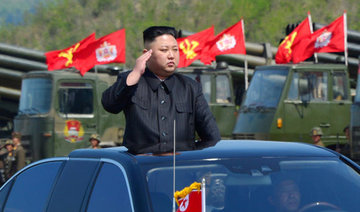WASHINGTON: North Korea has produced a nuclear warhead small enough to fit inside its missiles, US media reported Tuesday, marking a major development sure to further inflame already sky-high tensions.
The milestone comes as global alarm continues to mount over the accelerating pace of North Korea’s weapons program, with Japan calling recent steps a “new level of threat.”
The Washington Post cited parts of a Defense Intelligence Agency analysis that says officials now think North Korea has “nuclear weapons for ballistic missile delivery” — including in its intercontinental ballistic missiles.
The Pentagon did not immediately respond to a request for comment, but the Post said the assessment’s broad conclusions were verified by two US officials familiar with the analysis, and CNN said it had confirmed the report.
The Post said it was not known if North Korea had successfully tested the smaller warhead design, though North Korea last year claimed to have done so.
The progress means North Korea is further along the path to having a deployable nuclear missile than has previously been acknowledged.
Experts had until last month said it would still take another two or three years for North Korea to develop a nuclear-tipped ICBM. But that calculus suddenly changed after Pyongyang last month tested two ICBMs — the first time leader Kim Jong-Un had demonstrated such a capability.
The first of these trials, which Kim described as a gift to “American bastards,” showed the rocket had the potential range to hit Alaska.
The second rocket tested last week flew even longer, with some experts even suggesting that New York could be vulnerable.
The Post also reported that another intelligence assessment estimated that North Korea now has up to 60 nuclear weapons, more than previously thought.
Despite the advance, North Korea still must overcome technical hurdles before it can claim to have perfected its nuclear weapons technology.
After Kim’s second ICBM test, experts said it appeared the “re-entry vehicle” that would carry a warhead back into Earth’s atmosphere from space had failed.
Without proper protection during a re-entry stage, a missile’s warhead could burn up.
“North Korea likely made some of the key measurements required to define those extreme conditions during the two July tests, but I can’t imagine it has learned enough to confidently make a warhead that is small and light enough and sufficiently robust to survive,” Stanford University expert Siegfried Hecker said in an interview with the Bulletin of the Atomic Scientists.
The former Los Alamos National Laboratory director said advanced re-entry vehicles and mechanisms to defeat missile defense systems may still be years away.
“However, make no mistake, North Korea is working in all of these directions,” he said.
News that Kim appears to have produced a small nuclear warhead comes as tensions around Pyongyang’s program ratchet up ever higher.
“Especially since last year, when it pushed ahead with two nuclear tests and launched more than 20 ballistic missiles, it has posed a new level of threat,” Japan’s defense ministry said in an annual report that also reiterated concerns over China’s increasing military posture.
Japan, which lies across the sea from North Korea, has been wary for decades over its missile development as well as Pyongyang’s history of abducting Japanese citizens to train its spies.
The most recent ICBM test saw the failed re-entry vehicle splash down into waters off Japan’s Hokkaido island.
North Korea has vowed that tough new UN sanctions agreed over the weekend would not stop it from developing its nuclear arsenal, rejecting talks and angrily threatening retaliation against the United States.




























